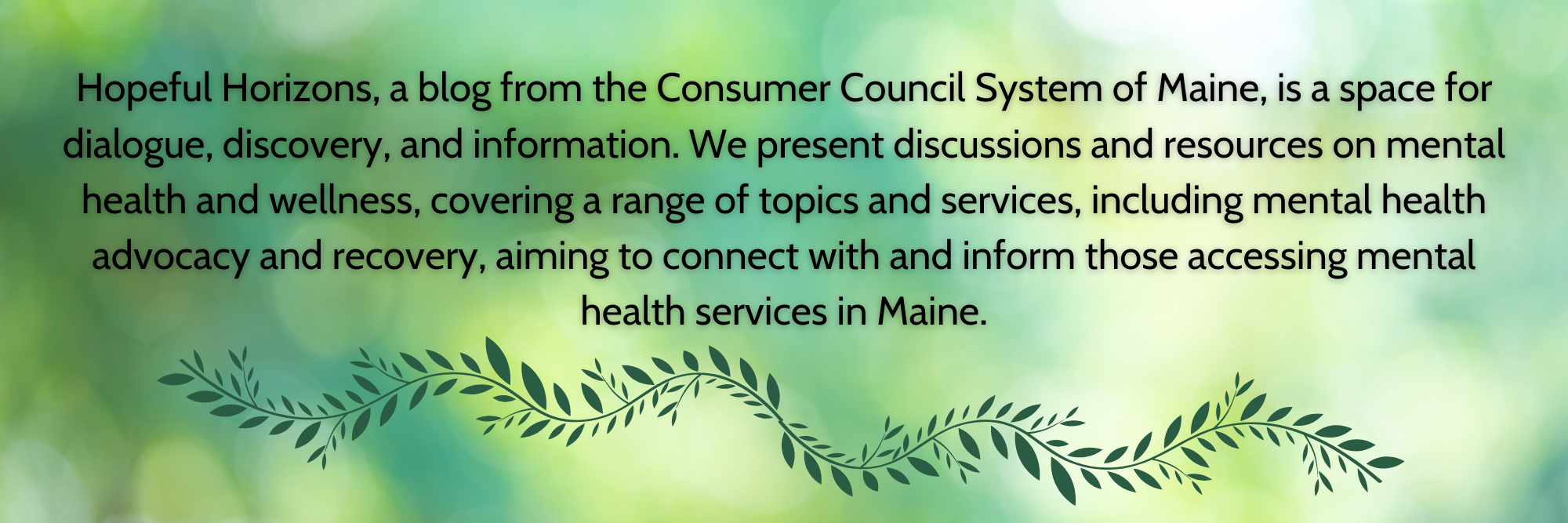

Check out the most recent Hopeful Horizons Blog post below!

Published: May 30, 2025
At The End of Mental Health Awareness Month: Finding Our Way Forward in Maine

AUTHOR: Brittany Lorance, Outreach Coordinator at CCSM
“Recovery is not just a hope; it is a profound and achievable reality”
As Mental Health Awareness Month draws to a close, we at the Consumer Council System of Maine reflect on the incredible strides we’ve made in fostering open conversations and reducing stigma around mental health. This month has been a powerful reminder that mental health is health, and that support, understanding, and connection are vital for everyone.
Here in Maine, the landscape of mental health services can feel unpredictable. We’ve seen significant challenges, from workforce shortages and long waitlists for care to the impact of federal grant cuts and payment delays affecting our community-based providers. These realities can leave individuals and families feeling uncertain and even overwhelmed when seeking the care they need.
It’s precisely in these moments of unpredictability that the strength of our community becomes our greatest asset. Coming together – to advocate, to support, and to connect – is the most powerful way to ensure that every Mainer feels seen, heard, and safe on their mental health journey.
Recovery is not just a hope; it is a profound and achievable reality. While the path may have its challenges, particularly in our current environment, we firmly believe in the power of resilience and the incredible potential for individuals to live full and meaningful lives in recovery.
Your voice matters. Stay informed about legislative efforts and policy changes affecting mental health services in Maine. Support organizations like ours that are actively advocating for sustainable funding, workforce development, and improved access to care. Engage with your local representatives and share your experiences.
Beyond formal services, never underestimate the power of informal support networks. Reach out to friends, family, faith communities, or local groups. Share your experiences, listen to others, and offer a helping hand. These connections are the bedrock of resilience.
As we move forward from Mental Health Awareness Month, let’s carry the message of hope, connection, and recovery with us every day. Together, we can navigate the unpredictable and build a stronger, healthier Maine for all.
Essential Resources for Support and Connection in Maine
As we continue to build a strong, supportive mental health peer network in Maine, it’s important to know where to turn for essential resources for support and connection. Even with current challenges, there are dedicated organizations and services working tirelessly to provide care and support in Maine.
- The Consumer Council System of Maine: We are a consumer-led organization dedicated to empowering individuals with lived experience of mental health conditions. We advocate for systemic change, promote recovery, and provide a platform for consumers to have their voices heard in policy discussions and service development. You can learn more about our initiatives and how to get involved by visiting our website: MaineCCSM.org
- Disability Rights Maine (DRM): DRM is Maine’s protection and advocacy agency for people with disabilities. They work to protect the rights of individuals with mental health conditions, ensuring access to services, combating discrimination, and advocating for fair treatment. DRM offers legal assistance, advocacy, and information on a wide range of disability-related issues, including those impacting mental health. Visit their website at: drme.org
- Speaking Up For Us (SUFU): SUFU is a statewide, self-advocacy organization run by and for people with intellectual and developmental disabilities. While their primary focus is on IDD, they are a powerful example of peer-led advocacy and empowerment, demonstrating how individuals with lived experience can drive positive change and create supportive communities. Learn more at: sufumaine.org
- Intentional Peer Support Warmline: 1-866-771-9276 – Speak with staff who have lived experience with mental health conditions, available 24 hours a day, seven days a week. This warmline offers a non-crisis space for individuals to connect with peers who understand their journey, providing empathy, shared experience, and supportive listening.
- Maine Crisis Line (MCL): 988 or 1-888-568-1112 – Call, text, or chat for individuals or families experiencing a behavioral health crisis or having thoughts of suicide and/or self-harm. This vital service is available 24/7, providing immediate support and connection to crisis resolution services.
- 211 Maine: Dial 211 (or 1-877-463-6207), text your zip code to 898-211, or visit 211maine.org – A free, confidential information and referral service that connects people across Maine to various health and social service resources, including mental health services, housing assistance, food insecurity programs, and more. It’s an excellent first step for navigating complex service systems.
- Maine DHHS Office of Behavioral Health (OBH): While facing challenges, the state’s Office of Behavioral Health (maine.gov/dhhs/obh) offers important information on publicly funded crisis services, early intervention programs, and recovery support services throughout Maine. Their website can provide an overview of state-level initiatives and resources.
- Alliance for Addiction and Mental Health Services, Maine: One unified voice for Maine’s substance use and addictions prevention, treatment, and recovery programs. https://thealliancemaine.org/
- Behavioral Health Community Collaborative – Sweetser https://www.sweetser.org/about/background-philosophy/behavioral-health-community-collaborative/
- NAMI Maine: Provides support, education, and advocacy for individuals and families affected by mental illness. https://namimaine.org
- MAPSARC (Maine Association of Peer Support and Recovery Centers): MAPSARC is a statewide organization dedicated to supporting and promoting peer-run recovery centers in Maine. These centers offer a safe, welcoming, and empowering environment for individuals in recovery, providing peer support, activities, and resources. You can find a list of centers and learn more at: https://www.maine.gov/dhhs/obh/support-services/substance-use-disorder-services/recovery-supports or check out their Facebook page.
- Maine Veterans’ Crisis Line: 1-800-273-8255 and Press 1, or text 838255. This specialized hotline is for veterans and their loved ones, offering confidential support and connection to resources.
You are not alone, and recovery is possible. By utilizing resources and leaning on the strength of our community, we can continue to build a more supportive and accessible mental health landscape for all Mainers.
Published: March 27, 2025
Talent Untapped: Lived Experience and the Power of Inclusive Employment

AUTHOR: Brittany Lorance, Outreach Coordinator at CCSM
“Employers Possess both the ability and a vested interest in cultivating work environments where all employees, regardless of mental health status, can flourish.”
Imagine a workforce where diverse perspectives and experiences are celebrated, where resilience and empathy are recognized as strengths, and where everyone has the opportunity to thrive. For individuals with mental health lived experience, this vision is often far from reality. Too often, their talent remains untapped due to discrimination, misunderstanding, and a lack of inclusive hiring practices. I would like to delve into the employment journey of people with mental health lived experience, exploring the challenges they face, showcasing the immense value they bring to the workplace, and offering concrete steps towards creating truly inclusive environments.
Societal discrimination and employer bias remain pervasive, creating significant hurdles for individuals with lived mental health experience seeking and maintaining employment. Fear of judgment and discriminatory attitudes can significantly impact hiring decisions, even when individuals possess the necessary skills and qualifications. This bias can manifest in numerous ways, from subtle microaggressions to overt acts of discrimination. For example, a qualified candidate might disclose their lived experience on an application or during an interview, only to find the position suddenly “filled” or the interview process abruptly concluded. Employers might make assumptions about an individual’s capabilities based on their mental health diagnosis, overlooking their strengths and focusing solely on perceived limitations. One common misconception is that individuals with mental health conditions are inherently unstable, unreliable, or prone to absenteeism. This can lead to employers overlooking their qualifications entirely, even if their past performance demonstrates otherwise.
Misconceptions held by employers often extend to workplace interactions, creating an environment where individuals with lived mental health experience struggle to feel comfortable and supported. This can manifest itself in subtle yet damaging ways, such as being passed over for promotions or excluded from team activities. Imagine an employee needing time off for a mental health-related reason. Instead of receiving the understanding and support typically offered for physical health concerns, they might face skepticism, pressure to “tough it out,” or even subtle discouragement. This disparity in treatment can cause further distress and negatively impact their overall well-being. Sometimes, the discrimination is far more overt. Individuals might endure direct comments about their mental health, be subjected to inappropriate jokes, or even face outright harassment. They may be given fewer responsibilities than their colleagues, denied access to training opportunities, or unfairly scrutinized in performance reviews. These actions can create a hostile work environment, making it incredibly difficult for individuals to thrive, regardless of their actual abilities. The cumulative effect of these experiences can be devastating, leading to feelings of shame, isolation, and a reluctance to disclose their lived experience in the future. This fear of discrimination can even prevent individuals from seeking a diagnosis altogether, leaving them without access to crucial support systems. This silence perpetuates stigma and creates a vicious cycle, hindering both individual well-being and the potential for a truly inclusive workplace.
Beyond bias, many workplaces lack the understanding or resources to provide appropriate accommodations, such as flexible hours, modified tasks, or access to mental health support services. This inflexibility can make it difficult for individuals to manage their mental health while maintaining employment, creating a cycle of instability. The financial strain associated with mental health treatment, coupled with potential income loss during periods of illness, creates a significant burden, often making it challenging to afford basic necessities like transportation and childcare – crucial for securing and maintaining employment. This financial pressure can exacerbate mental health challenges, further complicating the employment journey.
This reality of workplace challenges resonates deeply with my own experiences navigating the job market with neurodivergence. My employment history, while diverse—spanning roles from afterschool program director and grocery store cashier to substitute teacher, stable hand, and even budtender—reveals a common thread: the difficulty of finding stability and support within traditional work structures. Each role offered unique insights, but the rigid schedules and often inflexible expectations frequently exacerbated my mental health struggles, impacting my ability to thrive. I often found myself giving too much too quickly, setting an unsustainable pace that inevitably led to exhaustion and a desire to leave, or an inability to maintain the high bar I had set for myself, and unable to communicate to my employer that I was no longer capable of being as highly productive in a consistent way. Countless days were spent struggling, yet unable to utilize traditional sick leave policies designed primarily for physical illness. These days often resulted in reduced productivity at best, and truly traumatic experiences at worst, creating negative outcomes for both myself and my employers. This underscores the urgent need for employers to move beyond traditional sick leave policies and embrace a more holistic approach to employee well-being.
My experience at the Consumer Council System of Maine (CCSM), however, offers a stark contrast. Here, my strengths are genuinely appreciated, and I’m not judged when I need to take a break or adjust my work for my well-being. This understanding and flexibility, including accommodations for family responsibilities, have made all the difference in my ability to thrive as an Outreach Coordinator. It’s a powerful example of how supportive and inclusive workplaces, like the one I’ve found at the CCSM, can unlock the untapped potential of individuals with lived experience, creating a win-win situation for both the employee and the organization. This demonstrates that reasonable accommodations are not just good ethics; they are good business.
My story isn’t unique. Many individuals with lived experience possess a wealth of untapped talent, resilience, and unique perspectives that can significantly benefit workplaces. The key lies in creating environments where these strengths are recognized and nurtured, not dismissed or misunderstood. This means more than just offering flexible hours; it requires a fundamental shift in mindset. Employers must actively work to dismantle discriminatory practices, foster a culture of understanding and acceptance, and provide the necessary resources and support for employees to thrive.
Employers possess both the ability and a vested interest in cultivating work environments where all employees, regardless of mental health status, can flourish. Investing in mental well-being isn’t just ethically sound; it’s a strategic imperative for maximizing productivity and organizational success. The cost of inaction—lost productivity, high turnover, and difficulty filling open positions—far outweighs the investment in creating a supportive and inclusive workplace.
Ultimately, building truly inclusive workplaces is not just a matter of social responsibility; it’s a smart business decision. When individuals with lived experience are given the opportunity to succeed, everyone benefits. We encourage employers, colleagues, and community members to join us in this effort. Together, we can unlock the immense potential that currently lies dormant, creating a more equitable and vibrant workforce for all. Let’s move beyond awareness and take concrete action to build workplaces where everyone can thrive.
RESOURCES/LINKS
CONTACT US
For further information, please reach out to us at info@maineccsm.org or contact Brittany at blorance@maineccsm.org
